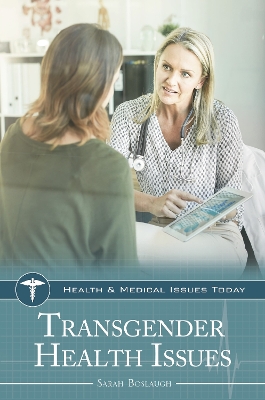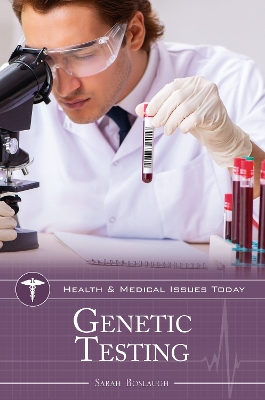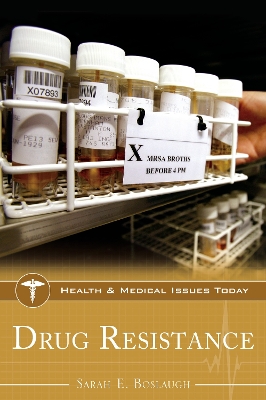Health and Medical Issues Today
4 total works
Transgender individuals face unique challenges when it comes to their physical, psychological, and social health and well-being. This accessible reference investigates these concerns in depth, offering readers insights into topics such as discrimination and access to health care.
Although transgender individuals have always existed, their fight for acceptance and equal rights is just beginning. Within this larger context, one area of emerging concern is their health—physical, psychological, and social. From legislation determining public restroom access to insurance coverage of hormone therapy for transitioning individuals to harassment and discrimination, transgender people face a number of challenges that can negatively affect their well-being.
A part of Greenwood's Health and Medical Issues Today series, Part I of this book explores definitions of sex and gender, the history of transgender awareness and activism, physical and psychological health concerns specific to transgender individuals, and how identifying as transgender can have different effects on individuals' health at different stages in their life. Part II examines issues and controversies related to the health and well-being of transgender individuals. Part III provides a variety of useful materials, including case studies, a timeline of critical events, a glossary, and a directory of resources.
Although transgender individuals have always existed, their fight for acceptance and equal rights is just beginning. Within this larger context, one area of emerging concern is their health—physical, psychological, and social. From legislation determining public restroom access to insurance coverage of hormone therapy for transitioning individuals to harassment and discrimination, transgender people face a number of challenges that can negatively affect their well-being.
A part of Greenwood's Health and Medical Issues Today series, Part I of this book explores definitions of sex and gender, the history of transgender awareness and activism, physical and psychological health concerns specific to transgender individuals, and how identifying as transgender can have different effects on individuals' health at different stages in their life. Part II examines issues and controversies related to the health and well-being of transgender individuals. Part III provides a variety of useful materials, including case studies, a timeline of critical events, a glossary, and a directory of resources.
This book provides a comprehensive yet accessible look at organ donation and transplantation, including coverage of scientific, medical, social, legal, and ethical issues. Readers will also discover how new technologies and medical advances are shaping the future of organ donation.
Donated organs and tissues have improved or saved the lives of hundreds of thousands of individuals. But these life-changing procedures raise many logistical and ethical questions. How can organs be effectively allocated to those in need? Should individuals be allowed to purchase organs from living donors? What role does religion and culture play in someone's decision to donate or accept an organ? Will new technologies like bioprinting change the future of organ donation?
Part of Greenwood’s Health and Medical Issues Today series, Organ Donation is divided into three sections. Part I explores different aspects of the donation and transplantation process, including which tissues and organs can be donated, living versus deceased donation, religious and cultural perceptions, and cutting-edge alternatives to traditional organ transplants. Part II delves deep into a variety of issues and controversies related to the subject, offering thorough and balanced coverage of such hot-button topics as opt-in versus opt-out systems, organ trafficking, and transplant tourism. Part III provides a variety of useful materials, including case studies, a glossary, and a directory of resources.
Donated organs and tissues have improved or saved the lives of hundreds of thousands of individuals. But these life-changing procedures raise many logistical and ethical questions. How can organs be effectively allocated to those in need? Should individuals be allowed to purchase organs from living donors? What role does religion and culture play in someone's decision to donate or accept an organ? Will new technologies like bioprinting change the future of organ donation?
Part of Greenwood’s Health and Medical Issues Today series, Organ Donation is divided into three sections. Part I explores different aspects of the donation and transplantation process, including which tissues and organs can be donated, living versus deceased donation, religious and cultural perceptions, and cutting-edge alternatives to traditional organ transplants. Part II delves deep into a variety of issues and controversies related to the subject, offering thorough and balanced coverage of such hot-button topics as opt-in versus opt-out systems, organ trafficking, and transplant tourism. Part III provides a variety of useful materials, including case studies, a glossary, and a directory of resources.
Genetic testing has provided important clues to understanding our health, but it has also raised many ethical, legal, and medical questions and concerns. This book explores the breadth of genetic testing, its possibilities, and the controversies that surround its use.
The mapping of the human genome has paved the way for a variety of genetic tests. Expectant mothers can have their fetus screened for a variety of genetic abnormalities, and couples worried that they might be carriers for a genetic disorder can be tested before deciding to have children. Women can be screened for the BRCA2 gene that has been linked to increased risk of breast cancer. Individuals curious about their ancestry can find out more about their heritage. Genetic testing can also be used to establish paternity and help solve crimes.
Part of Greenwood's Health and Medical Issues Today series, this book is divided into three sections. Part I explores the history of genetic testing, including the rise of direct-to-consumer tests, and outlines the current applications and contexts in which genetic testing is performed. Part II delves deep into the ethical, legal, financial, medical, and psychological issues and controversies that surround genetic testing. Part III provides a variety of useful materials, including case studies, a timeline of critical events, and a directory of resources.
The mapping of the human genome has paved the way for a variety of genetic tests. Expectant mothers can have their fetus screened for a variety of genetic abnormalities, and couples worried that they might be carriers for a genetic disorder can be tested before deciding to have children. Women can be screened for the BRCA2 gene that has been linked to increased risk of breast cancer. Individuals curious about their ancestry can find out more about their heritage. Genetic testing can also be used to establish paternity and help solve crimes.
Part of Greenwood's Health and Medical Issues Today series, this book is divided into three sections. Part I explores the history of genetic testing, including the rise of direct-to-consumer tests, and outlines the current applications and contexts in which genetic testing is performed. Part II delves deep into the ethical, legal, financial, medical, and psychological issues and controversies that surround genetic testing. Part III provides a variety of useful materials, including case studies, a timeline of critical events, and a directory of resources.



